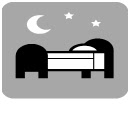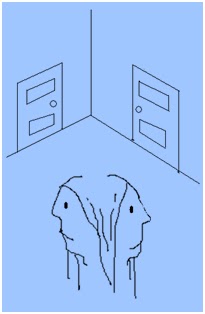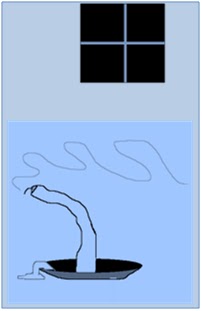The Spirit of Zacon
In the morning after I woke, as usual I found Mawgri already departed for work and my drawing of the paraglider gone with him. In its place was a pass from Sacacon, allowing me to study the book of the Saca god Zacon, and a coin and a note from Mawgri: “Give this to the priest of Zacon. It will quicken your steps.”
I ate a little, dressed with a toga over my body suit (to deter a lot of licking), and set out for the temple in which the logbook of Captain Hennessey was kept in a special vault.
Luvark drove me and helped me adjust the toga, so I looked more like someone used to wearing one. He and I had bonded from the moment of the assault: I suppose he considered me worthy as a warrior; now we had become partners.
I brought a camera with plenty of memory; I wanted to record the entire book to study at my leisure. I would skim each page while taking the photographs, but I knew I would need more time to thoroughly digest Hennessy’s story.
The Kandizam temple in which the book was kept was built into a cave in the side of the mountain opposite the capital of Sacawyz. Luvark parked in a dirt car park, and I labored up fifty meters of stairs to the cave while he watched from below. At the entrance to the cave stood an altar around which gathered a small crowd of worshippers, who burned incense and dropped coins into a collection box. Since none of the poor worshippers had ATIs, I couldn’t understand everything they murmured as I walked by them, but I made out a few familiar Putkur words and phrases: “save us,” “war,””god,””help Sacacon.”
At the mouth of the cave, I presented my pass to the ecclesiastical guards who were dressed in brown robes—just as the ones who had attacked Mawgri and me in the bazaar. They read the pass and waved me in, bowing. I walked in and was greeted by a bowing priest; I recognized the signature flowing robes from the telecast. I nodded and gave him the pass.
He read it and said, “Za Malcolm, come this way. It is a pleasure to serve a visitor of the Sacacon, Zacon’s representative in His Putkeen realm.” He had an ATI.
“Thank you.”
“How far did you come?”
“Many parsecs.”
“Did you come to see Zacon?”
“Not specifically, but now that I have some knowledge of him, I am curious to know more.”
“One who comes to Zacon with the spirit of Zacon is welcome.”
“I bow to Zacon,” I said, giving a slight bow and handing the priest the bright gold coin worth fifty zees that Mawgri had left beside the pass with a note. The priest took the coin, which quickly disappeared beneath his robes, and led me to the concrete vault whose metal door already gaped open like the mouth of Zacon. Inside was a pedestal and under glass on the pedestal rested Captain Hennessy’s logbook. The interior was lit by lanterns.
The priest said, “I will close the door while you read, so you will not be disturbed. How much time do you need?”
“Two hours should be sufficient.”
“Zacon bless your endeavors,” he said as he closed the door, so I was alone with the book.
I removed the glass cover and set it on a ledge that ran waist high around the wall. I opened the book to the first page. Starship logs were kept both digitally and in hardcopies as a backup system; once the spacecraft had ceased operating, the log could be continued only by hardcopy. I assumed the writing was in Captain Hennessey’s own hand.
The first page read as follows:
06/22/2348 CE, 9:17 Zulu
Our launch from the Martian space station went off without a hitch. We left at 23:02 Z yesterday and have already left the Solar System. The new drive is working like a charm. Breakfast has been served to all the crew and my staff is cleaning and getting ready to prepare lunch. I wanted to make this first entry as soon as I could on our first day out on our mission to explore dwarf star systems within 30 light-years of Earth.
23:09 Zulu
All meals went well this first day. A skeleton staff is left to cover the needs of the late shifts.
I chuckled to myself. Captain Hennessey had been the mess officer. No wonder I had never heard of him. Everyone knew about Admiral Yakimoto and General Zhiskov, but Captain Hennessey’s story had never been told, although he had had a very important function. A starship had a crew of several thousand humans. At least a thousand, probably 2500, would have been elite soldiers under the command of General Zhiskov, although everyone aboard would have been trained in combat with the newest weapons. Admiral Yakimoto had been in charge of the ship and everything on it including its crew of thousands and the exploration force of other hundreds, plus the pilots and crews of all the auxiliary craft: interceptors, attack fighters, repair lighters, lifeboats, freighters, and landing craft. Those thousands of people had to be fed multiple times every day. The mess officer had to make it happen: he had not only to prepare menus and oversee preparation, but he had to store and ration what he had and keep all fed and contented.
I pulled my camera from the folds of the toga and began clicking, photographing every page. Turning and clicking. Turning and clicking. Until I reached page 42 which stated the conditions that started the end of the Golden Hind:
08/03/2348 CE, 19:21 Zulu
My crew had just begun supper service when the Admiral’s voice came over the speakers to inform us that the ship was being influenced by an unknown force, and the bridge was struggling to maintain course. The scuttlebutt is that the ship has entered some kind of vortex that is pulling us off course and putting a strain on the ship’s superstructure.
22:00 Zulu
We have been ordered to man all auxiliary craft and launch into space toward the Crab. A distress call has been sent earthward. We are abandoning ship.
I decided I had better finish my photography before indulging in any more reading and wondering. The book ran to 305 pages, which told me that Hennessey had survived for 263 days after the disaster that destroyed the Golden Hind. I turned and clicked until I had reached page 305, which said only the following:
05/04/2349 CE, 06:08 Zulu
T will leave this book for Envak, and then I will kill myself.
I turned off the camera and replaced it into the folds of the toga. I checked my watch. I had been inside the vault for one hour and thirty-seven minutes. I had twenty-three minutes to kill, so I opened the book again and turned to page 43.
08/04/2348 CE, 07:15 Zulu
Last night I took my best cooks and cleaners onto the freighter Martian Moons, which I knew was loaded with foodstuff. Commander Morales was the pilot and welcomed us aboard although he told us we would have to sleep on the corridor floors as all the bunk space was taken by his crew. We had brought our weapons and armor with us. I made sure everyone in my unit was as comfortable as possible before the launch. Morales took us away from the Golden Hind at 23:06Z. Once we were safely away, he told us that he was heading toward a red dwarf system that was not far away. He estimated we would arrive in a few days, but it was hard to determine an exact ETA. I realized I would have to ration our food and needed a headcount, I counted my staff in the corridor: 24. Morales told me his crew numbered 8. However, when the first meal was served, 16 other individuals showed up (Including Mjr.T). They had come aboard during the general rush and had set up camp in an empty food bin. We had 49 souls on board. The freighter had a small kitchen, but I took it over with the captain’s permission.
As I finished the page and contemplated its import, I heard the vault door being opened. I closed the book, replaced the glass cover and went to the door to wait. The same priest pushed the door wide and bowed. I stepped out and said, “Thank you. I will inform the Sacacon of your helpfulness.”
“Zacon go with you.”
The faithful Luvark was leaning against his car as I started down the steps. When I was about halfway down, he looked up, saw me, got into the car and drove it to the bottom of the steps to pick me up.
On the way to Mawgri’s villa, I asked Luvark if he was hungry.
“Yes, Za Malcolm, it has been a long morning.”
‘Stop if you like. I’ll buy you whatever you like.”
“Will you eat?”
“No, I can wait until we’re at the house.”
“Then, I will wait, too.” He was devoted and would accept no more than I would accept for myself.
At the villa, the cook had already begun lunch for the house staff, so we joined them. (Mawgri had had everyone implanted with ATIs for my convenience.) Luvark and I sat at one end of the polished wood kitchen table while on the sides were the gardener, the custodian, the valet, and the housekeeper. The cook’s place was at the other end, but he was up and down serving us mashed taloos, tak bread, steamed wyrd, and kepoc chops. The table was silent as each Putkur and I imbibed. I knew that conversation during a meal was not the custom; besides, since I was considered nobility and their superior, they would wait for me to broach a topic.
Once everyone began sighing and grunting to show their satisfaction with the meal and their full stomachs, I said, “May I ask a general question?”
They bowed and said, “Of course, my lord.”
“What do you think of democracy?”
Only Luvark had mastered reading, so they were somewhat hesitant.
The cook said, “I don’t know much about it, except I hear Kunwyz is our ally, so the Sacacon must think it is ok.”
The valet said, “But you know a lot about cooking.”
“Thanks for saying so.”
The valet continued, “As for democracy, I think it will be good. Pardon me for saying so, my lord, but when the wind blows it puts grit into the eye of the lord as well as the common folk. Isn’t that so?”
I said, “Indeed it is.”
The gardener said, “I hear that we will all have to learn to read and write.”
“Yes, that is what Sacacon wants. If you vote, he wants you to be educated to make informed decisions. Luvark reads and writes, so what do you think of democracy?”
Luvark looked around at the table, but he didn’t look at me. “I have served the Sacacon all my life, but learning to read and write opened up my mind and made me realize that education is the key to advancement. Even the Sacacon would make poor decisions if he wasn’t aware of everything around him because he can read and write.”
The custodian spoke up, “I’ve been thinking about learning to read anyway because with all the new technology, everything is becoming more complicated.”
The housekeeper said, “But we all love Sacacon.”
That statement was greeted with a chorus of “Yes, yes. We love him.”
The valet said, “My Lord, is it true that Radimeer is threatening us?”
“Indirectly. Emperor Kra is threatening his neighbors, but the Sacacon knows that if he isn’t stopped now and is allowed to take over his neighbors, Saca would be next.”
The gardener said, “The Radimeen will be sorry. We will all join the battle lines and fight.”
I stood. They stood and bowed.
“Thank you for the wonderful meal. Please excuse me. I must continue my work.”
As I walked away, I heard the staff murmuring. A lord had never before sat down and eaten with them. He heard the cook say, “All I want to do is cook. These changes make my head swim.”
End of Chapter 5
Malcolm is, of course, excited by finding the logbook because he knows that at least one earthing survived the crash. He now has something significant to report.
Below are items related to this blog.















